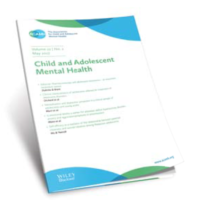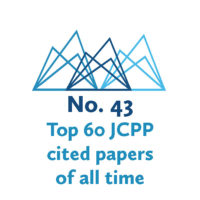School-based interventions
-

Bipolar debate
In the latest edition of the Child and Adolescent Mental Health (CAMH) journal we have a series of papers debating Bipolar. Get involved and give us your views.
Read more -

In Conversation… Professor Tasmin Ford the importance of schools in a child’s mental health
Professor Tamsin Ford, Professor of Child and Adolescent Psychiatry, University of Exeter Medical School, talks about attachment and early intervention, and explains why schools are an important setting in relation to child mental health.
Read more -

Most Cited JCPP Articles #43 of 60
Most cited JCPP papers #43 of 60: Preventing conduct problems and improving school readiness: evaluation of the Incredible Years Teacher and Child Training Programs in high‐risk schools
Read more -

In Conversation… Tourettes Syndrome
In this podcast, Dr Seonaid Anderson and Helen Eadie, of Tourettes Action, define Tourettes Syndrome and expand on its impact.
Read more -

How well children read is largely down to their genes
Children who are avid readers are typically good readers, and children who seldom read a book voluntarily often have dyslexia. Is their reading ability the consequence of how much they practised?
Read more -

Getting help with parenting makes a difference – at any age
Parenting interventions for helping children with behavioural problems are just as effective in school age, as in younger children, according to new Oxford University research.
Read more -

In Conversation… Reducing mental health problems in schools
Dr Sophie Browning is a Consultant Clinical Psychologist working on whole school approaches to mental health. In this podcast with psychology journalist Jo Carlowe, she discusses an innovative cognitive behavioural therapy approach for reducing anxiety and mental health problems in schools. You can listen to this podcast on SoundCloud or iTunes.
Read more -

Back to school
“The government has recognised the need for greater focus on child and adolescent mental health and wellbeing, although is yet to provide adequate funding to match its rhetoric or a clear strategy for what in-school intervention would look like. Whilst early preventative programmes can be really useful for young people, I can’t help but think that the newly proposed in-school mental health initiatives might to some extent be treating problems created by the education culture that has been set up.”
Read more -

Does mental health awareness do more harm than good? A response from Prof Tamsin Ford to The Spectator
The Spectator recently published an article on mental health awareness. Professor Tamsin Ford responds, “The dismissive tone of the article is unfortunate and undermines the important point that the author could have made, which is that policy should be evidence-based and evaluated for unexpected consequences.”
Read more -

The Olympics’ loss is psychology’s gain
Discover what was Professor Gordon Harold’s somewhat unlikely start in psychology.
Read more
